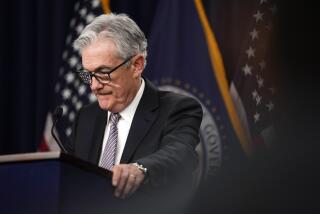Europe’s central bank hikes key rate amid boom
- Share via
The European Central Bank on Wednesday raised its benchmark interest rate to a near-six-year high of 4% and showed its readiness to hike again to combat inflationary dangers in a strongly expanding economy.
But ECB President Jean-Claude Trichet gave limited guidance on how soon the next rate increase would come, or how much tightening remains in store, leaving markets uncertain over the precise course ahead.
Stocks fell sharply across the continent. Investors’ mood also was soured by Wall Street’s slide Tuesday, when Federal Reserve Chairman Ben S. Bernanke sounded a warning about inflation pressures.
The quarter-point increase in the ECB benchmark marked a doubling of short-term euro-zone rates in 18 months.
While the Fed has been on hold over the last year, with its key rate at 5.25%, robust economic growth in Europe has spurred ECB policymakers to continue tightening credit.
“The ECB ... may have underestimated the economic-growth dynamic in the euro area,” said Thorsten Polleit, an economist at Barclays Capital.
The ECB sets rates for 13 nations in the euro-currency zone, including Germany, Finland, France and Spain.
Policymakers’ monthly statement said that monetary policy was “still on the accommodative side” after the increase. The wording suggested that the ECB hadn’t yet finished raising rates.
But analysts who had expected the next increase to come in September said Trichet cast doubt on that when he said he saw no reason for the ECB to meet in the holiday month of August, when policymakers usually hold a teleconference.
Because the central bank prides itself on preparing markets a month before a rate hike, some analysts said the ECB might be planning to wait until October or later to tighten credit further.
Hope for a delayed rate increase helped push down European bond yields, which have surged in recent months. The German government’s 10-year note yield slipped to 4.46% from 4.49% on Tuesday, which was the highest since 2003.
But falling bond yields didn’t help stock prices. The German DAX index slumped 2.4%, France’s CAC index dropped 1.7% and the Spanish market lost 1.4%. Stocks may have been overdue for a pullback, however, after soaring since March, analysts said.
In other interest rate moves:
* New Zealand’s central bank unexpectedly raised its benchmark rate to 8% from 7.75%, citing inflation concerns.
* Bucking the global trend, Brazil’s central bank cut its key rate to 12% from 12.5%. The bank had room to cut because Brazil’s strong currency is holding down inflation, analysts said.
More to Read
Inside the business of entertainment
The Wide Shot brings you news, analysis and insights on everything from streaming wars to production — and what it all means for the future.
You may occasionally receive promotional content from the Los Angeles Times.










